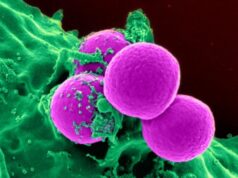An infographic describing the yearly number of mutations produced in a given type of cell by smoking a pack of cigarettes a day. Credit: Genome Research Limited
Scientists have measured the catastrophic genetic damage caused by smoking in different organs of the body and identified several different mechanisms by which tobacco smoking causes mutations in DNA. Researchers at the Wellcome Trust Sanger Institute, the Los Alamos National Laboratory and their collaborators found smokers accumulated an average of 150 extra mutations in every lung cell for each year of smoking one packet of cigarettes a day.
Reported in the Journal Science, the study provides a direct link between the number of cigarettes smoked in a lifetime and the number of mutations in the tumour DNA. The highest mutation rates were seen in the lung cancers but tumours in other parts of the body also contained these smoking-associated mutations, explaining how smoking causes many types of human cancer.
Tobacco smoking claims the lives of at least six million people every year and, if current trends continue, the World Health Organization predicts more than 1 billion tobacco-related deaths in this century. Smoking has been epidemiologically associated with at least 17 types of human cancer, but until now no-one has seen the mechanisms by which smoking causes many of these cancer types.
Cancer is caused by mutations in the DNA of a cell. In the first comprehensive analysis of the DNA of cancers linked to smoking, researchers studied over 5,000 tumours, comparing cancers from smokers with cancers from people who had never smoked. They found particular molecular fingerprints of DNA damage – called mutational signatures – in the smokers’ DNA, and counted how many of these particular mutations were found in the different tumours.
Find your dream job in the space industry. Check our Space Job Board »
The authors found that, on average, smoking a pack of cigarettes a day led to 150 mutations in each lung cell every year. These mutations represent individual potential start points for a cascade of genetic damage that can eventually lead to cancer. The numbers of mutations within any cancer cell will vary between individuals, but this study shows the additional mutational load caused by tobacco.
Dr Ludmil Alexandrov, first author from Los Alamos National Laboratory, said: “Before now, we had a large body of epidemiological evidence linking smoking with cancer, but now we can actually observe and quantify the molecular changes in the DNA due to cigarette smoking. With this study, we have found that people who smoke a pack a day develop an average of 150 extra mutations in their lungs every year, which explains why smokers have such a higher risk of developing lung cancer.”
Other organs were also affected, with the study showing that a pack a day led to an estimated average 97 mutations in each cell in the larynx, 39 mutations for the pharynx, 23 mutations for mouth, 18 mutations for bladder, and 6 mutations in every cell of the liver each year.
Until now, it has not been fully understood how smoking increases the risk of developing cancer in parts of the body that don’t come into direct contact with smoke. However, the study revealed different mechanisms by which tobacco smoking causes these mutations, depending on the area of the body affected.
Prof David Phillips, an author on the paper and Professor of Environmental Carcinogenesis at King’s College London, said: “The results are a mixture of the expected and unexpected, and reveal a picture of direct and indirect effects. Mutations caused by direct DNA damage from carcinogens in tobacco were seen mainly in organs that come into direct contact with inhaled smoke. In contrast, other cells of the body suffered only indirect damage, as tobacco smoking seems to affect key mechanisms in these cells that in turn mutate DNA.”
The study revealed at least five distinct processes of DNA damage due to cigarette smoking. The most widespread of these is a mutational signature already found in all cancers. In this case, tobacco smoking seems to accelerate the speed of a cellular clock that mutates DNA prematurely.
Professor Sir Mike Stratton, joint lead author from the Wellcome Trust Sanger Institute, said: “The genome of every cancer provides a kind of “archaeological record”, written in the DNA code itself, of the exposures that caused the mutations that lead to the cancer. Our research indicates that the way tobacco smoking causes cancer is more complex than we thought. Indeed, we do not fully understand the underlying causes of many types of cancer and there are other known causes, such as obesity, about which we understand little of the underlying mechanism. This study of smoking tells us that looking in the DNA of cancers can provide provocative new clues to how cancers develop and thus, potentially, how they can be prevented.”
Source: Wellcome Trust Sanger Institute
Journal Reference:
- “Mutational signatures associated with tobacco smoking in human cancer,” Science,science.sciencemag.org/cgi/doi/10.1126/science.aag0299











